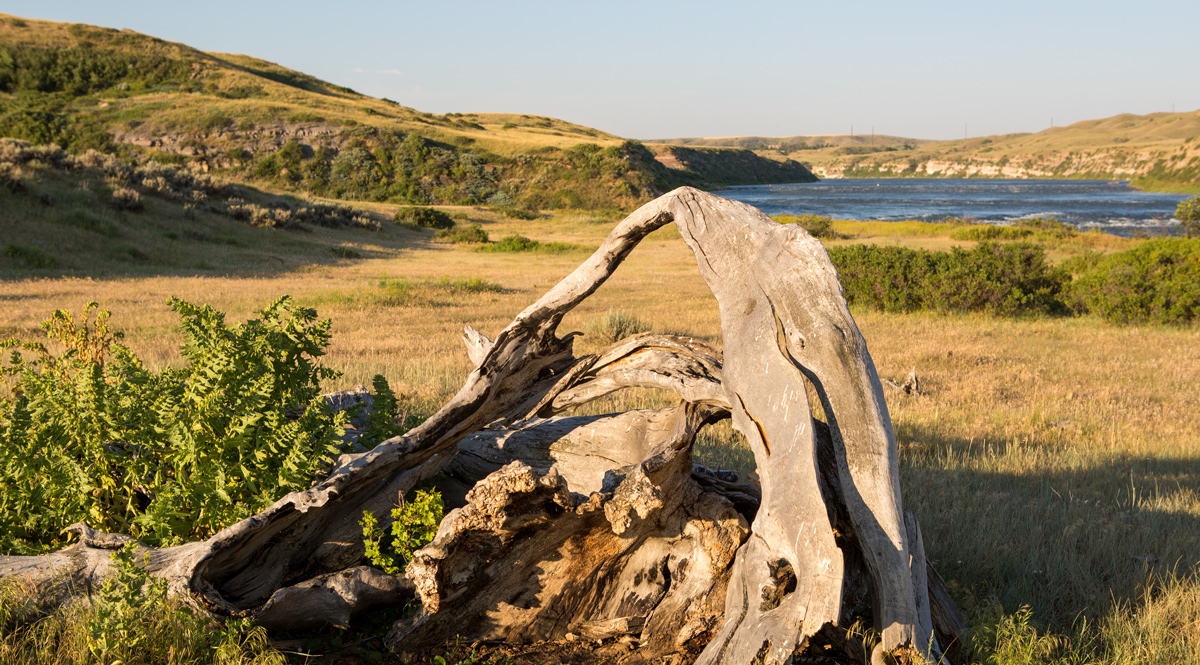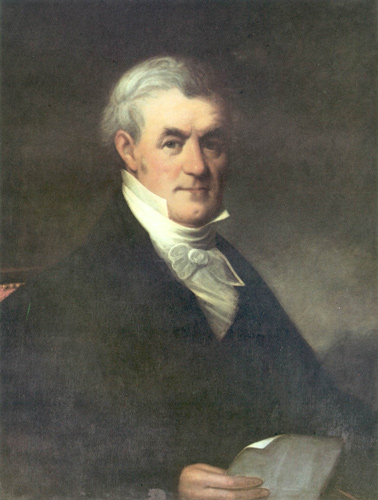Below the Falls of the Missouri, William Clark delegates cooking to Charbonneau and enjoys a cup of coffee. Before night, two more dugout canoes are hauled up the portage hill.
At the upper camp, Drouillard and Pvt. Frazer bring in 800 pounds of dried meat and a grizzly bear harasses Pvt. Joseph Field.
In Washington City, President Thomas Jefferson shares news of expedition with Massachusetts Representative William Eustis.
Cottonwood Stump at Lower Portage Camp
© 30 June 2015 by Kristopher K. Townsend. Permission to use granted under the Creative Commons Attribution-Share Alike 4.0 International license.
A “Romantick Appearance”
This Countrey has a romantick appearance river inclosed between high and Steep hills Cut to pieces by revines but little timber and that Confined to the Rivers & Creek, the Missourie has but a fiew Scattering trees on its borders, and only one Solitary Cotton tree in sight of my Camp
—William Clark
Portage Crew Returns
we Set out with the 2 truck waggons and returned back to the lower Camp for another load. took 2 canoes up the hill on the high plains the day proved pleasant and warm the men much fatigued.
—John Ordway
Hiding from a Grizzly
in runing in order to escape from the bear he [Joseph Field] had leaped down a steep bank of the river on a stony bar where he fell cut his hand bruised his knees and bent his gun. that fortunately for him the bank hid him from the bear when he fell and that by that means he had escaped.
—Meriwether Lewis
800 Pounds of Dried Meat
in the evening Drewyer and Frazier [Frazer] arrivd with about 800 Ibs. of excellent dryed meat and about 100 Ibs of tallow.
—Meriwether Lewis
A Cup of Coffee
Set Chabonah [Toussaint Charbonneau] &c to Cook for the party against their return—he being the only man left on this Side with me I had a little Coffee for brackfast which was to me a riarity as I had not tasted any Since last winter.
—William Clark
Shaking a Foot
The party that returned this evening to the lower camp reached it in time to take one canoe on the plain and prepare their baggage for an early start in the morning after which such as were able to shake a foot amused themselves in dancing on the green to the music of the violin which Cruzatte plays extreemly well.
—Meriwether Lewis
Weather Diary
State of the thermometer at rise
Weather Wind at rise
State of the thermometer at 4 OC. P.M. Weather Wind at 4 OC. P. M. State of river 47 [above 0] cloudy after rain S. W. 72 [above 0] fair S. W. —Meriwether Lewis[1]To assist the reader, the editor of this web page has omitted the date column, merged the “State of the river” columns, and spelled out some abbreviations.
William Eustis
by Walter M Brackett (1823–1919)
Oil on canvas, 73.6 cm (28.9 in) by 60.9 cm (23.9 in) painted in 1873. Courtesy U.S. Army, history.army.mil/books/sw-sa/Eustis.htm.
William Eustis (1753–1825) was a revolutionary war soldier, long-time state Massachusetts legislator, and in 1804, United States Representative. He would lose his bid for re-election, and return to state politics. In 1809, as James Madison’s Secretary of War, he warned Lewis that the government would no longer honor his letters of credit. This led in part to Lewis’s trip to Washington D.C., to clear his name—the trip on which be died at Grinder’s Stand. For more on that fateful trip, see The Last Journey of Meriwether Lewis.
Expedition News
President Thomas Jefferson writes Massachusetts Representative William Eustis, with news of several Indian delegates that arrived in St. Louis on the expedition’s barge.
Washington June 25. 05.
Dear Sir
. . . . .
I have the pleasure to inform you that one of Capt. Lewis’s barges, returned to St. Louis brings us certain information from him. . . . he has sent in his barge 45. deputies from 6. of the principal nations in that quarter, who will be joined at St. Louis by those of 3. or 4. nations between the Missouri & Missisipi, and will come on here. . . . we shall endeavor to get them to go on as far North as Boston, being desirous of impressing them correctly as to our strength & resources. this with kind usage, and a commerce advantageous to them, & not losing to us, will better secure their & our peace & friendship than an army of thousands.
. . . . .
Accept my friendly salutations, & assurances of great esteem & respect
Th: Jefferson[2]Thomas Jefferson to William Eustis Founders Online, National Archives, founders.archives.gov/documents/Jefferson/99-01-02-1956. [from The Papers of Thomas Jefferson.]
Experience the Lewis and Clark Trail
The Lewis and Clark Trail Experience—our sister site at lewisandclark.travel—connects the world to people and places on the Lewis and Clark Trail.
Plan a trip related to June 25, 1805:

The Great Falls Portage is a High Potential Historic Site along the Lewis and Clark National Historic Trail managed by the U.S. National Park Service. It includes Sulphur Springs (open to the public) and Lower Portage Camp site (private land), and the Upper Portage Camp Overlook.
Notes
| ↑1 | To assist the reader, the editor of this web page has omitted the date column, merged the “State of the river” columns, and spelled out some abbreviations. |
|---|---|
| ↑2 | Thomas Jefferson to William Eustis Founders Online, National Archives, founders.archives.gov/documents/Jefferson/99-01-02-1956. [from The Papers of Thomas Jefferson.] |




